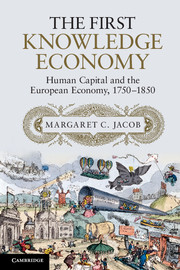Book contents
- Frontmatter
- Contents
- List of Figures
- List of Maps
- Acknowledgements
- Introduction
- 1 A portrait of early industrial lives
- 2 The knowledge economy and coal
- 3 Technical knowledge and making cotton king
- 4 Textiles in Leeds
- 5 The puzzle of French retardation I
- 6 The puzzle of French retardation II
- 7 Education and the inculcation of industrial knowledge
- Conclusion
- Bibliography
- Index
- References
Introduction
Knowledge and industrial development: the stakes
Published online by Cambridge University Press: 05 June 2014
- Frontmatter
- Contents
- List of Figures
- List of Maps
- Acknowledgements
- Introduction
- 1 A portrait of early industrial lives
- 2 The knowledge economy and coal
- 3 Technical knowledge and making cotton king
- 4 Textiles in Leeds
- 5 The puzzle of French retardation I
- 6 The puzzle of French retardation II
- 7 Education and the inculcation of industrial knowledge
- Conclusion
- Bibliography
- Index
- References
Summary
By “the first knowledge economy” we refer to the era of the Industrial Revolution from roughly the 1760s to the 1850s, first in Britain and then in selected parts of Northern and Western Europe, with particular attention to Belgium. Only and first in this period did economic growth based upon technological innovation become continuous. There were ebbs and flows to be sure, recessions, even depressions, but still the wealth of the affected nations continued to grow, and, slowly, so too did per capita income of families. Put another way, the so-called Malthusian dictum, that prosperity would fuel population growth that would inevitably be stopped by food shortages, came undone. By the last quarter of the nineteenth century, real wages had risen, as had the population in general, and output in agriculture and manufacturing had also risen to meet the new demand.
Since that time the debate has raged as to how the dictum had been broken. What were the key factors that made sustained Western prosperity possible? The answer presented in this book focuses upon mechanical knowledge, derived largely but not exclusively from Newtonian science, and the theoretical underpinnings that it supplied to technological innovation in mining, manufacturing, and the application of steam power more generally. The new knowledge economy displayed many cultural elements – wider circulation of information, new teaching venues, and curricular reforms – more visible first in Britain than on the Continent. None of the elements was more important than the organized body of mechanical knowledge distilled in lectures, textbooks, and curricula. It was what French observers came to call industrial mechanics and it became crucial to technological innovation. When we speak in the present about our knowledge economy, it helps to know where and when an earlier version of it began.
- Type
- Chapter
- Information
- The First Knowledge EconomyHuman Capital and the European Economy, 1750–1850, pp. 1 - 19Publisher: Cambridge University PressPrint publication year: 2014



